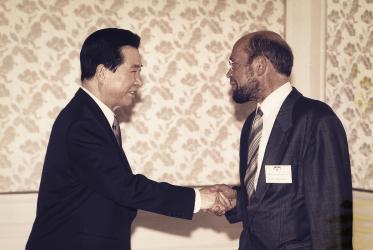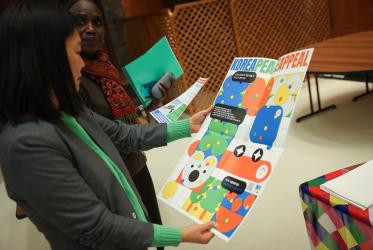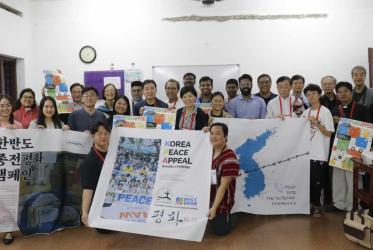For he is our peace; in his flesh he has made both groups into one and has broken down the dividing wall, that is, the hostility between us.
(Ephesians 2:14)
Turn from evil and do good; seek peace and pursue it.
(Psalms 34:14)
The central committee of the World Council of Churches (WCC), meeting in Geneva on 21-27 June 2023, is deeply concerned by the accelerating cycle of confrontation and provocation between joint US-Japan-South Korea military exercises, and North Korean missile tests. We pray for peace and dialogue to end this dangerous cycle, and for denuclearization not only of the Korean Peninsula but of the entire world.
In a time of renewed escalation of tensions and confrontation on the Korean Peninsula, we recall that this year marks the 70th anniversary of the 1953 Armistice Agreement which established a ceasefire, but not a formal end, to the Korean War.
Inter-Korean relations have experienced a major deterioration since the abrupt and inconclusive end of the US-North Korea Summit in Hanoi in 2019. This deterioration was exemplified by North Korea’s demolition of an inter-Korean liaison office in June 2020. Compounded by the closure of borders following the outbreak of the COVID-19 pandemic, a complete breakdown of communication between the governments, private organizations, civil society, and churches in North and South Korea has ensued.
The WCC has supported encounters between North and South Korean Christians and international ecumenical cooperation for peace and reunification on the Korean Peninsula for close to 40 years. However, due to the current global circumstances, encounters with counterparts from the Korean Christian Federation (KCF) of North Korea have not been able to take place since December 2019. As we meet in this sombre anniversary year, we pray for the restoration of the relationship with our sisters and brothers of the KCF, and the resumption of joint ecumenical witness and action by North and South Korean Christians for peace on the Korean Peninsula and reunification of the divided Korean people.
To help break this current cycle of confrontation, we believe that an important step would be to formally acknowledge the end of the Korean War 1950-1953 by replacing the temporary Armistice Agreement with a peace treaty. Seventy years of suspended state of war is illogical, and a deeply unconstructive context for engaging with current realities on the Korean Peninsula. Moreover, a peace treaty to replace the Armistice Agreement is a longstanding commitment and objective of the South Korean National Council of Churches in Korea (NCCK) as well as of the KCF in North Korea, and supported by the WCC (as reflected in the WCC 11th Assembly Minute on ending the war and building peace on the Korean Peninsula, and in the WCC’s ‘The Light of Peace’ initiative).
The central committee therefore:
Appeals for steps to be taken to declare a formal end to the Korean War, and to replace the 1953 Armistice Agreement with a peace treaty.
Calls on all WCC member churches and ecumenical partners, especially those in countries whose forces participated in the Korean War 1950-1953, to advocate with their governments for such a declaration and peace treaty.
Urges the governments of the United States of America, Japan, South Korea and North Korea to refrain from statements and military actions that risk further escalating confrontation and tensions in the region, and instead take steps to reduce tensions and to create an environment conducive to dialogue.
Strongly recommends relaxation of the ‘maximum pressure’ sanctions[1] on North Korea, which have failed in their stated purpose of preventing North Korea from acquiring nuclear weapon capabilities but which present major obstacles to diaconal cooperation with the North Korean people, as well as to political dialogue.
Encourages the WCC secretariat, as soon as practically feasible, to resume ‘people-to-people’ encounters between Christians from North and South Korea, accompanied by representatives of the wider global ecumenical fellowship, as an important means of fostering trust, mutual understanding, and peace.
Invites member churches, ecumenical partners and all people of good will to reflect on “the things that make for peace”[2] in the context of the Korean Peninsula, to consider supporting the ‘Korea Peace Appeal’ promoted by the NCCK, to participate in the observance of the annual Sunday of Prayer for the Peaceful Reunification of the Korean Peninsula[3], and to stand in solidarity with Korean churches and accompany their efforts towards a permanent peace regime in the region and the world.
We pray for the permanent members of the UN Security Council to work together for the peaceful reunification of the Korean Peninsula.
[1] North Korea is one of the most sanctioned countries in the world. While sanctions used to target mostly the country’s military and elite, they have evolved in recent years into an almost total ban on North Korea-related trade, investments, and financial transactions – dubbed ‘maximum pressure’ by the Trump Administration. Several UN agencies have raised alarm at the impact on the population, with growing calls for humanitarian and human rights impact assessments.
[2] Luke 19 :42 ; Romans 14 :19
[3] The annual Sunday of Prayer for the Peaceful Reunification of the Korean Peninsula is observed on the Sunday before 15 August every year. 15 August, celebrated as Liberation Day in both North and South Korea, marks the date in 1945 when Korea won independence from Japanese colonial oppression, but it was also was the day when the peninsula was divided into two countries. The Korean Christian Federation Central Committee (North Korea) and the National Council of Churches in Korea (South Korea) have traditionally collaborated in composing a joint prayer for each annual observance.





